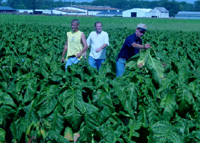Dark Tobacco Research Aims for Improved Varieties
Dark Tobacco Research Aims for Improved Varieties

To the untrained eye, the sight of smoke billowing out of a barn would signal the need to call the fire department. But in western Kentucky, smoking barns can be seen each fall along many rural roads as farmers cure their dark fire-cured tobacco crop.
Dark varieties of tobacco are grown in about 30 counties in the state and generate some $60 million in cash receipts. Those receipts are divided among two types of dark tobacco - air-cured and fire-cured.
To aid farmers in their efforts to attain a high quality, disease resistant crop, researchers at the University of Kentucky continue to search for new varieties and improved cultural practices. That work is being done by the University of Kentucky, University of Tennessee and at Murray State University.
The work is headed by Robert Miller, an internationally noted tobacco breeder. Miller holds a joint appointment with UK and the University of Tennessee, which merged their tobacco breeding programs in 1999. He is collaborating with Murray State on the same research which attempts to develop varieties with the quality of the old varieties and disease resistance of newer varieties, he said.
The work is focusing on black shank resistance along with black root, wildfire and tobacco mosaic virus resistance.
The cross pollination and disease screening work is conducted at Lexington and Greeneville, Tenn., where the seeds are planted into highly infected black shank soils. Seeds are then selected from the plants showing the most resistance. These selections are evaluated for resistance to other diseases in greenhouses during the winter. Seed that have the desired combination of disease resistance undergo further black shank screening the following year.
Those selections are also evaluated at three sites where they are grown out and cured. Those sites are the UK Research and Education Center in Princeton, Murray State University and UT's Highland Rim Experiment Station in Springfield.
Hundreds of lines will be tested for yield and quality and disease resistance at the three sites. Each year they are further refined in the breeding process until after five to six years, when they are disease resistant. Then, they are further evaluated for yield and quality.
And before a variety is released commercially, it is sent for on-farm evaluations. It is at this step where the researchers get feedback from the farmers on how well the crop grows and cures and compares to the variety they are currently using.
"It's a 10 to 12 year process," Miller said. "We have hundreds of lines in various stages of development."
Miller, who has been breeding tobacco for 20 years, said they are two to three years away from having a variety ready for commercial use. He released his last line in 1995, he said, and would like to have a new one to release every five years or so. To date, he has developed and released three dark tobacco and four burley tobacco varieties commercially.
Any varieties released commercially will be owned jointly by UK and UT, said Miller who joined UK's staff in 1998.
Other work being done by the researchers include nitrogen fertility, foliar fertilization and trickle irrigation studies.
The same varieties being tested for fire-curing at the UKREC are also being studied for use as Green River Type air-cured tobacco, Miller said. But little research as been done with new One Sucker type varieties. Miller said more research needs to be done in air-cured tobacco varieties and efforts are under way to make that happen.
The work is funded by U.S. Tobacco Co. with the exception of Miller's salary. Law prohibits any federal research dollars from being spent on anything that will be in a tobacco product. A similar funding arrangement is being negotiated with another company for burley breeding research, he said.
"What's unique is that there are no strings attached," Miller said. "Everyone has access to the varieties no matter who they sell their crop to. I tell them what I'm doing, I have total control of the research."
